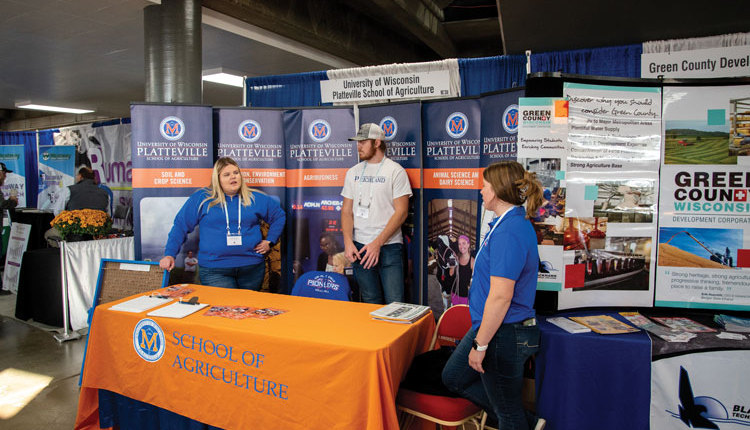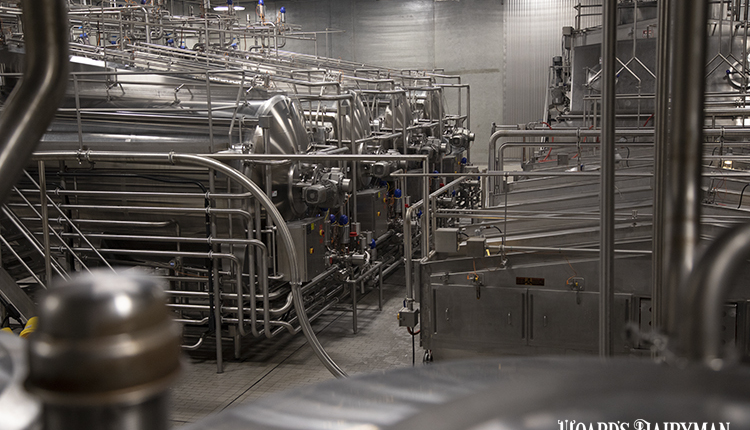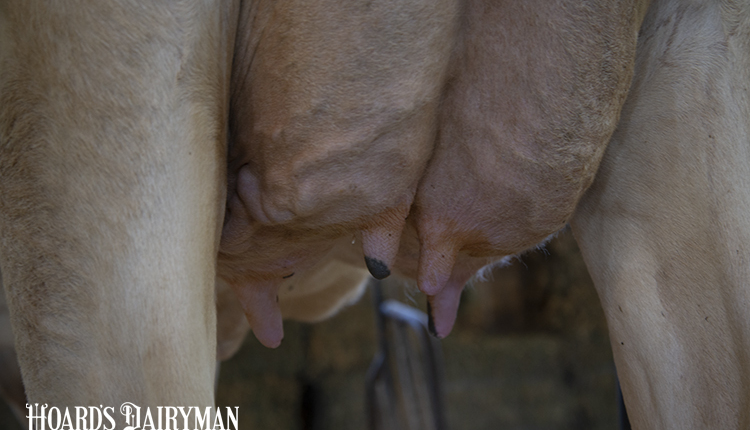
The dairy farming journey of Troy and Barb DeRosier and their son Jordan of Crystal Ball Farms has been anything but straight and short — long and winding would be a more accurate description. They don’t have an actual crystal ball to look into the future despite what their farm name suggests, but they have always been prepared to face what comes next and do whatever it takes to succeed.
Even from the beginning, the story of this farm was somewhat nontraditional. “I farmed with my dad growing up,” Troy said. “He actually grew up in town, so we rented a few different places over the years before we finally stayed at the site we are currently at.” They first brought cows to their current site near Osceola, Wis., in 1996 and were renters there until purchasing the farm in 2008. Today they are milking 160 Holsteins in a double-12 parallel parlor.
Taking control of their future
In the beginning, the DeRosiers were a conventional operation and shipped their milk to Associated Milk Producers Inc. (AMPI). However, they faced challenges within their family as their first son, Jared, was born with disabilities. With the additional care needed for Jared, they had to think outside the box about how they operated their farm.
Creating their own market was ideal for this family, as it provided a steadier income from their milk. “Sometimes, you never knew what was going to come in the mail from that milk check,” Troy said.
“We built the creamery in 2003, the same year our second son Jordan was born, and we started bottling milk soon after that,” Barb explained. “It was anything but easy during that time, as we were trying to figure out how to get everything up and running.”
Crystal Ball Farms became an organic dairy in 1991 to create a niche market for their milk, but when they added the creamery, it also helped the family connect with consumers. “We liked being organic because it was an easy way for customers to tell that we produce quality milk and we put a lot of care into our product,” Troy explained. “They didn’t have to visit the farm to know that about us.”
Changing course
The cows are housed in a freestall barn that was built in 2018 after an electrical fire destroyed most of their previous barn. Troy described the chance to rebuild as challenging but very helpful. “I had many ideas about what I would do if I had the chance to build a new barn, so it was nice to implement those ideas.” However, the fire put a roadblock in their organic certification.
After the fire, the cows had to be moved off-site, which resulted in a lack of pasture availability and a different diet. As a result, they had to give up their title as an organic dairy. “It would have taken years to get that certification back, so we decided that it was meant to be and moved forward with producing non-GMO milk,” Troy described. “This was actually very easy since being organic already makes you non-GMO.”
Their new freestall barn has a focus on labor efficiency and sustainability. Conveyor belts bring feed from the silos to the cows in the barn and the heifers in a neighboring shed. Manure in the alleys is scraped by a robot into the slatted floor which leads to the underground manure pit. Further, the gray water from the creamery is stored and then used to flush the parlor’s holding pen. The next step for them will be the installation of a feed-pushing robot.

Quality pays off
The cows come first at Crystal Ball Farms, but the customers are a close second. Products can often be purchased from the store the very same day the milk came from the cows. They also started a home delivery service to customers within a certain radius when COVID-19 struck.
The DeRosiers not only do their best to ensure quality service, but they also do everything they can to make the best quality milk. Their milking system monitors the milk of each cow and will indicate if there is a change in milk production or quality. Even further, once a cow is being treated for mastitis, a block is put in the milking system. Cows are identified by an electronic ID tag, and the milkers are then notified of a cow’s condition before they have a chance to put on the milker.
For the last 14 years, they have been breeding for the A2-A2 beta-casein protein, which has become known to be more easily digestible by some people. This aids in increasing the quality of the milk and sometimes makes it the only milk that certain customers can drink, the DeRosiers noted.
They found that losing the status as organic actually helped milk quality. “It was trickier to make consistent milk when we were organic,” Troy described. “When cows are on pasture, that changes the milk a lot and also brings shelf life down. Now that their diet is much more consistent, so is their milk, and customers like to taste consistency.”
Since beginning the creamery, they have tried making just about every single product that can be made from milk, including cheese, cream, butter, ice cream mix, flavored milks, and even frozen pizzas for a few years. Between production coming to a halt after the fire, and then the COVID-19 pandemic influencing their operation, they have reduced their product line to fluid milk and cheese curds. Their lineup of vat-pasteurized, non-homogenized milk includes everything from skim to whole, and from classic chocolate to fan-favorite mocha.

Every half gallon or pint of milk comes in their signature glass bottle to further ensure milk quality. For repeat customers, the bottle deposit will be refunded upon its return.
Troy and Barb employ a manager for the creamery plus a dozen employees that operate the creamery and the farm. For three days out of each week, about 30% of the milk from the cows is being bottled or made into delicious cheese curds, while the rest of their milk continues to be shipped to the AMPI cooperative.
Customers far and wide show appreciation of the DeRosiers’ attention to detail and commitment to producing quality products and have for many years. First, the fire did not damage the creamery, but it halted production for eight months. Then, when the pandemic hit, they lost about 50% of their sales due to the shutdown of the coffee shops and restaurants that purchased their milk, cream, and cheese. In-store sales, though, remained strong.
“Our best customers are still right here,” Troy beamed. “The most profits still come from our store front right here on the farm.”
Looking into the crystal ball
The DeRosier family has seen it all. They have experienced hardship and disaster, but they have also felt the love and support of the community around them. They open their barn doors to the public for farm tours, and with nearly two decades of milk processing experience, Troy has given dozens of tours to folks looking to start their own creamery.
“In the last 20 years, if there has been a person in Wisconsin looking to start their own creamery, they have been through here,” Troy remarked.
The farm’s name came from Troy’s late father, Don, who emphasized the farm should always be looking to the future, ready to face any challenge. Throughout the years, they have upheld their namesake.
“We’re always looking ahead, for ourselves and for the dairy industry,” Barb said.
Jordan is currently attending Chippewa Valley Technical College in Eau Claire, Wis., studying animal science. Upon graduation, he plans to return to the farm full time to carry on the legacy this family has built.
“A lot has changed over the years,” Troy explained. “But for now, I think we’re quite content with where we’re at.”









